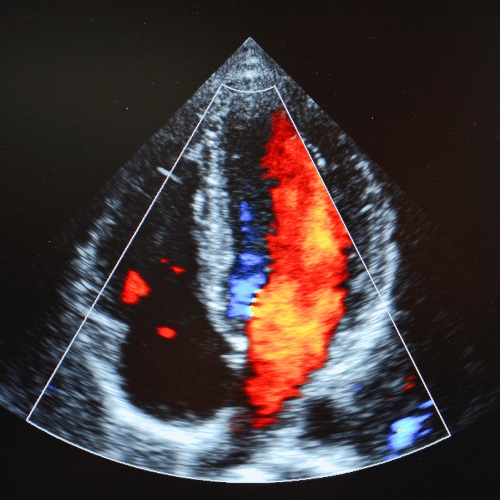
Medical Weight Loss Explained
A lot is said about medical weight loss but we are here to debunk the myths for you.

Find Out More


An echocardiogram, often referred to as an “echo,” is a non-invasive, ultrasound-based test that provides a detailed image of your heart’s structure and function.
Using sound waves, this test allows our medical professionals to see real-time images of your heart’s chambers, valves, and blood flow, ensuring we get a comprehensive picture of your cardiovascular health.
It is different from an ECG (electrocardiogram), which measures the electrical activity of the heart.

An echocardiogram can be crucial for diagnosing and monitoring a range of heart conditions. It helps in assessing heart valve issues by evaluating valve function and detecting conditions such as stenosis or regurgitation.
The test is also important for evaluating heart failure, as it provides insights into the heart’s pumping efficiency and overall function. Additionally, echocardiograms are used to identify congenital heart defects, which are structural abnormalities present from birth.
They can also detect and assess cardiac tumours, identifying any abnormal growths within the heart. Finally, an echocardiogram is useful for checking pericardial effusion, which involves fluid accumulation around the heart.
Depending on your symptoms or conditions, different types of echocardiograms may be recommended. The Transthoracic Echocardiogram (TTE) is the most common, using a chest transducer to create detailed images of the heart’s chambers and valves. The Transoesophageal Echocardiogram (TEE) provides clearer images of areas behind the heart by inserting a flexible tube with a transducer into the oesophagus.
A Stress Echocardiogram combines an echocardiogram with a stress test, such as exercise, to assess heart performance under stress and diagnose coronary artery disease. The Doppler Echocardiogram measures blood flow speed and direction to evaluate heart valve function and detect issues like regurgitation or stenosis, whereas a 3D Echocardiogram offers a three-dimensional view of the heart’s structures, and a Fetal Echocardiogram examines the heart of an unborn baby during pregnancy to identify congenital defects.
Each type provides specific insights based on individual needs and conditions.


With detailed insights into your heart’s condition, an echocardiogram allows for personalised care, tailoring treatment plans to your specific needs. Ongoing monitoring is another advantage, enabling you to track the progression of existing heart conditions and evaluate the effectiveness of treatments.
Ultimately, an echocardiogram provides peace of mind, giving you confidence in your heart health through comprehensive, real-time imaging.
After your echocardiogram, there is generally no special care required. You can resume normal activities immediately. Here is what to keep in mind:
Use our online booking engine or book your test by giving us a call.
On the online booking engine select the “appointment type” you need.
You will be seen by one of our friendly doctors or trained clinicians.

When preparing for your echocardiogram, wear comfortable clothing to ensure ease during the procedure. Follow any specific instructions regarding eating or drinking beforehand to ensure accurate results. Be prepared to remove clothing above the waist, as this will allow the technician to access the area needed for the test. It is also important to inform the technician about any medications you are taking or any health conditions you have. Throughout the test, try to relax and breathe normally to help obtain the clearest images possible.

During the echocardiogram, a technician will first apply gel to your chest. This gel helps to ensure a good connection between the transducer and your skin. A wand-like device, known as a transducer, is then moved over your chest to capture images. The transducer uses sound waves to create detailed images of your heart’s structure and function. The procedure is painless and typically takes about 30 – 60 minutes to complete.

In many cases, the technician cannot provide results directly. Your doctor will review the images and discuss the findings with you during a follow-up appointment. You can resume normal activities immediately unless advised otherwise. If you underwent a TEE (transesophageal echocardiogram) and were sedated, avoid operating heavy machinery or making important decisions until the effects of the sedative wear off.
Incorporated
in 1998
Experienced doctors & a professional team
Registration
not needed
Up-to-date with the latest treatments & testing
Strictly
confidential
Experienced doctors & a professional team
Affordable private
health care
Transparent fee structure with no hidden charges
We work with experienced consultants & healthcare professionals who have received positive feedback from our patients, and with whom we have established long-term relationships.
Latest Episode
Tune in to our podcast to explore the world of healthcare and learn from distinguished special guests. We cover everything from preventative measures to cutting-edge treatments so that you can stay informed and up-to-date on health-related things.

A lot is said about medical weight loss but we are here to debunk the myths for you.

Tourist in London and need a GP? Get fast, private care for illnesses, injuries, or lost medication. No registration needed.

With NHS appointments harder to access, many people are turning to private GPs for faster, more convenient care.
Subscribe for latest updates & news


From same-day private GP and blood test appointments to visa medicals, a sexual and reproductive health clinic, and preventative health screenings, we are here to help.
Contact Us
Accepted Insurance Companies






Please note that Walk-in Clinic is a private medical centre & not an NHS service. Harley Walk-in Clinic Ltd company registration no. 07472804